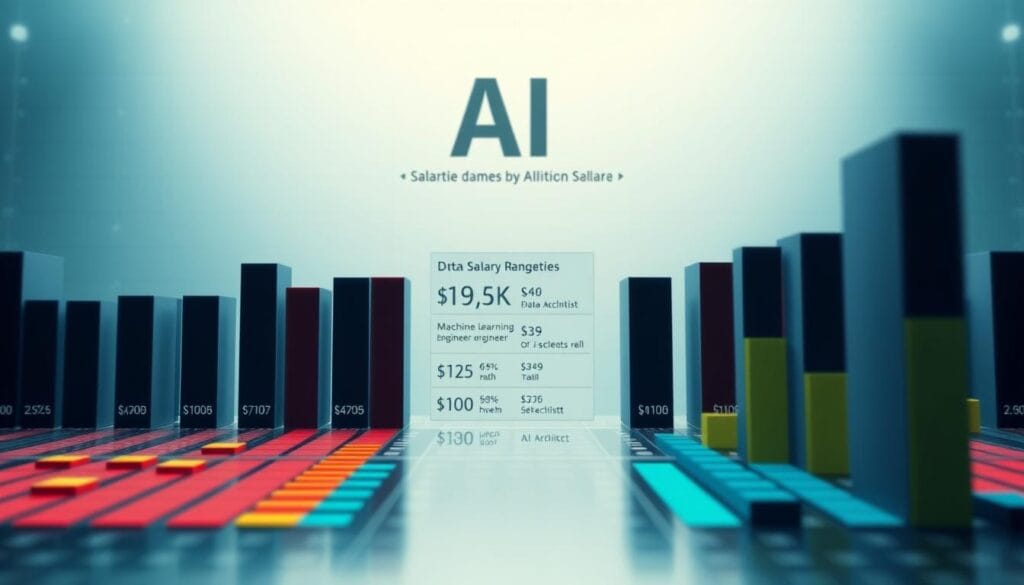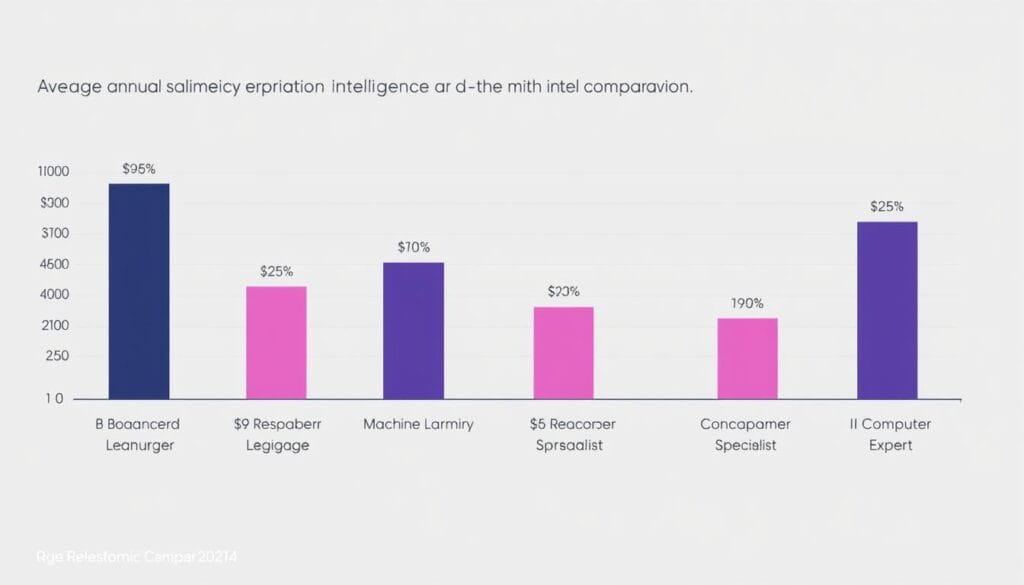Top artificial intelligence engineers earn over $200,000 annually in Silicon Valley, according to 2024 Glassdoor reports. This compensation outpaces software engineering averages by 38%, reflecting unprecedented demand for machine learning expertise.
The artificial intelligence sector shows 72% faster salary growth than general tech roles since 2020. Specialized positions like natural language processing architects and computer vision specialists drive this trend, with major tech firms competing for limited talent.
This analysis combines data from the Bureau of Labor Statistics and industry salary surveys. It explores compensation ranges across experience levels, geographic regions, and AI specializations. Later sections detail how advanced degrees and niche technical skills influence earning trajectories.
Emerging opportunities in healthcare AI and autonomous systems development suggest continued salary expansion. Professionals combining neural network expertise with cloud architecture knowledge position themselves for premium compensation packages.
Key Takeaways
- AI specialists earn 20-40% more than traditional software developers
- Machine learning engineers report median base salaries of $164,000 nationally
- Advanced degrees correlate with 27% higher starting compensation
- Finance and healthcare sectors offer top AI remuneration packages
- Certifications in TensorFlow/PyTorch boost earning potential by 18%
Overview of AI Careers and Financial Opportunities

The artificial intelligence sector is reshaping global labor markets, with PwC predicting a $15.7 trillion boost to the world economy by 2030. Industries from healthcare to finance now compete for professionals who can design adaptive algorithms and interpret complex datasets.
High Demand in the AI Industry
U.S. machine learning roles grew 26% faster than overall tech hiring in 2023. Financial institutions like Goldman Sachs now deploy AI teams to optimize trading strategies, while hospitals leverage predictive models for patient care. This surge creates unprecedented opportunities for engineers specializing in neural networks and automation systems.
Global Impact and Economic Potential
Emerging markets report 58% year-over-year increases in AI adoption. Automotive manufacturers use computer vision for quality control, and retailers employ natural language processing for personalized marketing. JPMorgan Chase recently invested $2 billion in AI-driven cash flow analysis tools, demonstrating the strategic value of intelligent financial systems.
Salaries reflect this transformation. Entry-level data scientists command $112,000 base pay in tech hubs, while senior AI architects earn premium compensation packages. The field rewards continuous skill development, with TensorFlow-certified professionals seeing 22% faster career advancement.
How much money can you make in AI? A Detailed Look

Recent labor statistics reveal striking compensation disparities across AI specialties. The Bureau of Labor Statistics reports a $134,000 median annual salary for artificial intelligence engineers, with top-tier professionals in machine learning exceeding $218,000. Compensation structures vary significantly by technical focus and years of experience, creating distinct earning trajectories.
Salary Ranges for Different AI Roles
Entry-level machine learning engineers average $112,000 nationally, while senior architects in neural networks command $185,000+. Glassdoor data shows:
- Computer vision specialists: $127,000-$201,000
- AI research scientists: $145,000-$235,000
- Natural language processing engineers: $132,000-$194,000
Bonuses and stock options add 12-28% to base pay in competitive markets. Professionals working on streamlining insurance claims processes through AI automation often receive performance-based incentives.
Comparative Earnings: Engineering, Research, and Data Roles
Machine learning engineers outearn data scientists by 19% in tech hubs like San Francisco. Research positions at pharmaceutical companies offer 8% higher base pay but fewer stock options compared to engineering roles. A 2024 analysis found:
“Specialists combining Python expertise with TensorFlow certifications achieve 22% faster salary growth than peers without niche skills.”
Five-year experience milestones typically boost earnings by 63%, with cloud integration techniques creating the most substantial pay jumps. These patterns underscore the value of targeted skill development in high-demand AI domains.
Influential Factors Affecting AI Salaries

Compensation structures in artificial intelligence reflect a complex interplay of technical expertise and market dynamics. Three primary elements shape earning potential: professional qualifications, geographic placement, and employer-specific valuation of specialized skills.
Experience, Skills, and Educational Background
Advanced degrees create immediate salary advantages. PhD holders earn 27% more than bachelor’s degree recipients in comparable roles, per 2024 industry surveys. Each additional year of hands-on experience with neural networks or deep learning frameworks boosts compensation by 9-14%.
Technical proficiency remains critical. Professionals certified in PyTorch or TensorFlow secure 18% higher starting salaries. Specialized skills like reinforcement learning implementation or multimodal AI development command premium rates, particularly in sectors requiring tailored budget advice with AI-powered tools for financial modeling.
Location and Market Variations within the United States
Geographic disparities reveal stark contrasts. San Francisco-based machine learning engineers average $182,000 annually, while Austin counterparts earn $149,000 despite similar experience levels. New York financial institutions pay AI specialists 22% more than healthcare employers in Boston, reflecting sector-specific demand.
Employers adjust offers based on regional cost indices and talent availability. Tech hubs like Seattle combine competitive salaries with tax incentives, whereas emerging markets like Raleigh-Durham offer accelerated career growth to offset slightly lower base pay. These variations underscore the importance of strategic location selection for maximizing lifetime earnings.
Earning Potential Across AI Job Titles

Specialization dictates compensation in artificial intelligence, with technical responsibilities and industry demand creating clear earning hierarchies. Roles requiring advanced algorithm design and system optimization consistently outpace generalist positions, reflecting the premium placed on niche expertise.
Role-Specific Compensation Patterns
Machine learning engineers lead salary rankings at $164,000 median pay, according to industry salary benchmarks. AI engineers follow closely at $146,000, while data scientists average $135,000. These disparities stem from differing core responsibilities:
Research-focused positions command premium compensation. Computer vision architects earn 18% more than application developers due to complex model training requirements. Roles integrating deep learning frameworks with real-world systems show the strongest correlation to six-figure salaries.
Practical skills directly influence earning capacity. Professionals with TensorFlow certifications report 22% higher starting wages than uncertified peers. Coding proficiency in Python and C++ remains essential, with algorithm optimization experience adding $18,000 to average offers.
Sectors prioritizing strategic AI implementations, like healthcare diagnostics, pay 14% above market rates. Engineers developing business optimization tools often negotiate performance bonuses tied to system efficiency gains. This compensation structure rewards measurable technical impact.
Strategies to Increase Your AI Salary
Professionals seeking higher compensation in artificial intelligence must adopt strategic skill development and negotiation tactics. Specialized expertise in machine learning frameworks and cloud integration techniques remains critical for commanding premium salaries across industries.
Building In-Demand Skills and Earning Certifications
Leading platforms like Coursera report 42% salary increases for professionals completing TensorFlow certification programs. Focus on mastering multimodal AI systems and reinforcement learning architectures – skills that correlate with 19% higher compensation in tech hubs.
Prioritize credentials demonstrating practical application. Stanford’s Machine Learning Professional Certificate graduates secure roles averaging $157,000 base pay. Continuous software updates demand ongoing education – 73% of top earners complete at least two technical courses annually.
Effective Negotiation and Career Advancement Tips
Preparation separates successful negotiators. Research regional pay benchmarks using tools offering financial guidance from virtual assistants powered by before salary discussions. Document measurable project impacts – optimized models reducing operational costs by 18% justify higher compensation.
Industry surveys reveal professionals combining certifications with mentorship achieve 31% faster promotions. “Technical expertise forms the foundation, but strategic career positioning drives earnings,” notes a 2024 LinkedIn Emerging Jobs Report. Regularly update your skill portfolio with emerging technologies like quantum machine learning to maintain competitive advantage.
Implement these strategies today: Enroll in PyTorch specialization courses, negotiate performance-based bonuses, and track industry salary trends through verified platforms. Professionals updating their expertise quarterly report 27% higher lifetime earnings than peers maintaining static skill sets.
Emerging Trends and the Future of AI Careers
Industry analysts forecast a 26% surge in AI-related positions through 2028, driven by accelerated adoption across healthcare, manufacturing, and financial services. PwC research indicates 73% of enterprises plan to expand machine learning teams, creating opportunities for specialists versed in emerging technologies.
Job Growth Projections and Market Demand
Computer vision roles are projected to grow 34% faster than other tech occupations as automation transforms quality assurance processes. Businesses increasingly seek professionals capable of implementing natural language processing systems, with job postings requiring these skills up 41% since 2023.
Three factors shape market dynamics:
- Expansion of edge computing infrastructure requiring AI optimization
- Demand for real-time data interpretation in supply chain management
- Regulatory pressures driving ethical AI development teams
Adapting to New Technology and Continuous Learning
Learning engineers who update skills quarterly earn 19% more than peers, according to LinkedIn’s 2024 Workforce Report. Mastery of multimodal AI systems and quantum machine learning frameworks now separates top earners in competitive markets.
Successful professionals combine technical expertise with strategic adaptation. As one Google DeepMind researcher noted:
“The next frontier involves teaching machines contextual understanding – a skill that will redefine human-AI collaboration.”
Organizations prioritize teams demonstrating proficiency in cloud-based neural networks and adaptive algorithm design. Continuous education programs focusing on these areas show 27% higher career advancement rates among participants.
Conclusion
Artificial intelligence careers offer transformative earning potential for professionals who strategically align skills with market demands. Median annual salaries exceeding $164,000 for machine learning engineers underscore the financial rewards available in this dynamic field. Geographic factors create 22% pay variations across the United States, while advanced degrees boost starting compensation by 27%.
Three elements drive success in AI roles: technical proficiency in frameworks like TensorFlow, continuous adaptation to emerging models, and strategic career positioning. Professionals updating skills quarterly report 19% faster salary growth than peers. Specialized certifications in deep learning and computer vision remain critical differentiators in competitive job markets.
Forward-thinking engineers combine hands-on experience with academic credentials. Those completing degree computer science programs while mastering cloud-based tools achieve 31% faster promotions. The sector rewards measurable impact – optimized neural networks reducing operational costs command premium compensation packages.
To maximize earning potential, professionals must monitor industry trends and negotiate using verified salary benchmarks. Emerging opportunities in ethical AI development and edge computing demand updated technical portfolios. Immediate action to enhance expertise positions candidates for high-growth roles shaping tomorrow’s intelligent systems.

